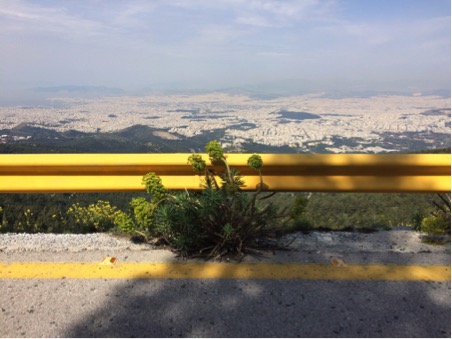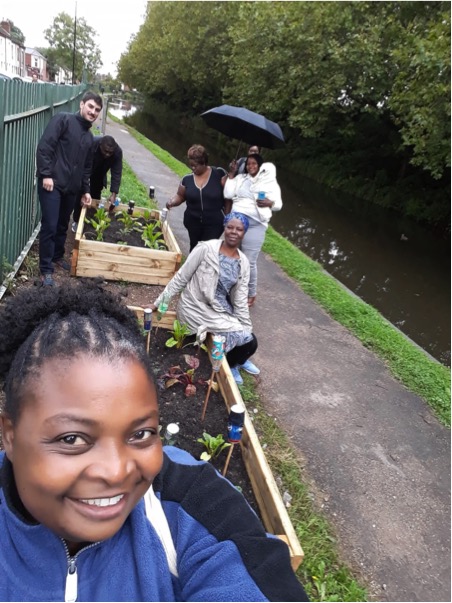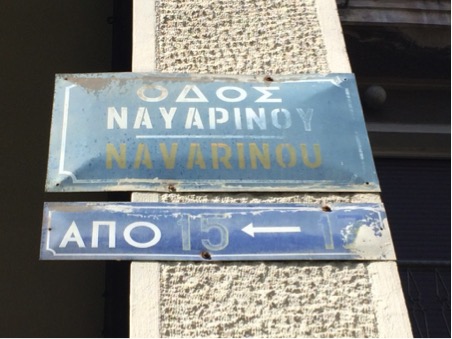By Sergio Ruiz Cayuela and Chiara Tornaghi.
In the light of privatisations, austerity and scarcity that characterise the current expansion of neoliberalism, an increasing number of communities are facing a crisis of social and material reproduction. What are the interlinkages between communities, common spaces and social reproduction, in the construction of post-capitalist alternatives and particularly the urban commons?
A crucial element of commons are communities, which are defined by boundaries. In the panel we organised for the International Conference of Critical Geography, held in Athens, 19-23 April 2019, we discussed the interlinkages between communities, common spaces and social reproduction, in the construction of post-capitalist alternatives and particularly the urban commons. In our panel, titled “Building the urban commons: exploring the interlink between (non)bounded communities, common spaces and social reproduction”, we wanted to explore the tensions created at these boundaries in urban contexts, particularly when common spaces are created from what has previously been in State hands, such as public space, public parks or other public assets (i.e. libraries, waterways, etc).
Building on the work of Stavros Stavrides, the first question that we posed to the panel was:
“How do we not turn common spaces into enclaves of privilege, or ‘collectively private’ spaces (Stavrides 2016), when the community of commoners rely on them for their social reproduction?”
The question is particularly salient for projects that, in light of limited opportunities to access fundamental resources, such as land, turn to the ongoing neoliberal dismantling of public assets to start building urban commons . Many of these initiatives are developed after asset transfers from public hands to volunteer management, or as self-organised responses to tackle austerity-led cuts (i.e. community centres, libraries, portions of parks). Orchards, or community gardens with an interest in building food commons, for example, are faced with the problem of ensuring a harvest that can enable them to move away from capitalist food circuits for their social reproduction. This often poses dilemmas of enclosing goods that have been otherwise open to a wider public. This question brings us to reflect on material considerations, such as space and property rights, if, as Massimo De Angelis (2017) puts it, commoning is the right to manage (regulate, use and transform) as well as the right to exclude (or not include). When it comes to the commoning of public space/land then, the issue of boundaries brings with it some ambiguity. Should we – as David Harvey – consider enclosure a temporary political means to pursue a common political good, or should we – with Zapatista Subcomandante Marcos – strive not ever to look like capitalism?

On boundaries…Athens, April 2019. By Chiara Tornaghi.
We believe that, although intrinsically excluding, boundaries can also be an element where commons thrive. In fact, “boundary commoning allows the expansion of commons systems … and interaction among different commons” (De Angelis 2017: 24). Thus, a second question we raised in the panel was:
“How can these boundaries be created in a way that are not only exclusive? How can urban commons be enclosed in a way that boost the creation of more groups of commoners, and thus, multiply the creation of commons?”
Some of the ambiguities we wanted to namely explore were around: how to enable these boundaries to still perform the tasks of being porous and fuzzy, and at the same time to simplify the complexity inside the system? And what political strategies and mechanisms are relevant to make these boundaries generative?
The main contributions that emerged throughout the discussions could be summarised around three lines, each expanding the relevance of a reflection on the boundaries for the practical and theoretical development of the urban commons.
The first one concerns the materiality of the urban commons. Debates on commoning seem to be often dichotomised around those that mainly focus around building new subjectivities and promoting symbolic experiences and ‘confluences’ that multiply and exemplify what commoning might mean (i.e. the Occupy movement), and those that focus on concrete and tangible experiences of commoning particular resources (i.e. housing, land, food), especially in relation to social reproduction. The separation of these two positions or approaches, and the way they deal with boundaries, was put into question several times when issues of materiality were considered. For example, is asking “what is the carrying capacity of land when building a food common” merely an issue of Malthusianism, or rather a consideration of the material limits of subtractable goods when communities rely on the commons for their livelihoods? How does this finitude limit the pursuing of openness and expansion – inherent characteristics of the commons?
Another material condition that can ground a reflection on the boundaries of commons is related to direct threats. When commons systems are threatened by external violence (i.e. Rojava or the Zapatista experience) is it possible for communities to organise their social reproduction without creating collectively private spaces and networks? From this discussion on materiality arose the idea that the urban commons are always materially grounded. Take as an example meeting spaces for community groups, or the material footprint of peer-to-peer online platforms, not to say community gardens or co-housing projects. This material basis of the commons, in turn, plays a key role in configuring the commoning practices. The issues raised in this debate reinforce, rather than discourage, the need to reflect on material boundaries and their excluding effects, as commons – and life itself – do have a material basis. However, the extent to which these practices are limited by material considerations will depend on the selective and contingent positions in which the commoners will find themselves (and the extent to which their livelihood depends on those very commons they strive to build).

The ‘Reclaiming the Coventry Canal’ group working on their guerrilla garden in Foleshill (Coventry), September 2019. By Sergio Ruiz Cayuela.
A second issue that cut across many of the contributions in our panel was the role of the state and the dynamics in play at the boundary between the commons, the state and capital. Urban commons rely many times on inputs from private companies (i.e. wages, donations) and public institutions (i.e. funding, public space) for their reproduction. However, these rarely come at no cost. Guidelines and conditions set by these (higher-level) institutions usually apply, that could turn the commons to a mere extension of the state (or of the market). In relation to this dynamic, a key debate amongst commoners is how porous can boundaries be when dealing with state (and capital) institutions, in order to avoid cooptation?
Another angle to this discussion arises from the austerity measures that are being ceaselessly rolled out since 2008 in the Global North. In this context, public institutions might favour citizen-managed initiatives that deliver public services in order to progressively dismantle the public provision of welfare. In these conditions, commoners find themselves at a crossroads between obtaining greater material autonomy (by taking over some of the spaces/resources/services given up by the state) and which will in turn contribute to the reproduction of the commons, or fighting for institutional responsibility over public welfare service delivery (i.e. health care, education, sport facilities).
The relationship with the state was also problematised in terms of the prefigurative value of the commons, and the contradiction of collaborating with the state when trying to build emancipatory alternatives. Whereas urban commons rely many times on public support for their reproduction, they might be playing a role in legitimising institutions where neoliberal modes of governance are reproduced. These reflections seem to bring back again the dichotomy mentioned above between symbolic and material commons, that could be seen in the dilemma between cooptation and precarity. Federici and Caffentzis’s work suggest how to navigate this tension:
“This is not to say that we shouldn’t fight to ensure that the public is not privatized… We cannot abandon the state, since it is the site of the accumulation of the wealth produced by our past and present labor. Similarly, most of us still depend on capital for our survival, as most of us do not have land or other means of subsistence. But we should work to ensure that we go beyond the state and capital.” (Federici & Caffentzis 2018: 96)

The ‘Navarinou Park’ is a self-organised green space with multiple uses in a densely populated area of Athens, Exarchia. April 2019. By Chiara Tornaghi.
Finally, a third recurrent topic in the discussion was the relationship between commoning, work and care. Commoning practices challenge the exchange of goods and services based on monetary values. However, many of the commoners inhabiting urban spaces rely -to a certain extent- on wages for their social reproduction. As commoning practices strive to change the world, they are bound to live the tension between these two realities – commodified and non-commodified spheres of life – and their contradictions. However, as De Angelis has argued, to reduce the dependency from capitalist relations it is important to advance the construction of the commons in the realm of social reproduction (i.e. food growing and preparation, childcare and eldercare, housing, etc.). As feminist scholars have argued for a long time (i.e. Kats, Hayden, Federici) food and care, however, are the spheres that historically have been neglected (even in Marxist theory) as spheres of oppression and value creation, even and perhaps especially because carried out by women as decommodified, unpaid and alienated labour.
In the discussion it was argued that commoning should include a feminist approach to social reproduction as labour, and should also provide a space for practicing non-alienated labours for the well-being of marginalised communities. Thus, within the ongoing challenge of living the tension between commodified and non-commodified spheres of life, integrating non-alienated care practices with commodified ways of ensuring social reproduction emerged as a key challenge. Some participants refused to consider care as work, (or to associate commoning to an economic reasoning) as in their opinion that would mean reducing care to a mere physical activity. This highlights the fact that labour related to social reproduction is embedded in every commoning project, but gendered aspects of these specific tasks are rarely recognised amongst the commoners.
Scale , or the visibility of caring practices, was also discussed: more specifically the need to bring the notion of “care” outside and beyond the household, and use it as a tool to transform our identities and build commoning subjectivities.
The role of more-than-human beings emerged specifically in relation to care: several participants advocated for the need to integrate embodied knowledge as crucial part of commoning practices, and to include the more-than-humans in the community of commoners. Care for the soil, for example, and the time it takes to build and reproduce its vitality (cfr. Puig de la Bellacasa 2017), impact on the way we can conceive the temporality and the attachment to specific material spaces and other-than-human life, in a context in which commoning projects are constantly evicted .
Overall, we could say, considerations of “care” have opened up a space to reflect on many more types of boundaries and degrees of porosity than we had previously foreseen: those between being human and non-human, those between gendered practices, those between commodified and non-commodified reproductive work, those between transient and place-based projects. This reconceptualisation of boundaries opens up the multiplicity of generative interactions between and across commoning practices. Far from reconciling the dichotomy between material and non-material approaches, this debate has stressed the need for a feminist political ecology approach to urban commoning.
References
De Angelis, M. (2017). Omnia Sunt Comunia. On the Commons and the Transformation to Postcapitalism. Zed Books.
Federici, S. & Caffentzis, G. (2018). Commons against and beyond Capitalism. In Federici, S. (ed.) Re-Enchanting the World. Feminism and the Politics of the Commons. PM Press.
Puig de la Bellacasa M. (2017), Matters of care. Speculative ethics in more than human worlds. University of Minnesota Press.
Stavrides, S. (2016). Common Space. The City as Commons. Zed Books.
Sergio Ruiz Cayuela is a Marie Skłodowska Curie PhD fellow at the Centre for Agroecology, Water and Resilience, Coventry University, as part of the RECOMS project. His research interests include the urban commons as an emancipatory alternative and their interaction with the circuits of capital and the state. He is also interested in alternative environmental movements (particularly working-class and subaltern environmentalism) and their development of guerrilla narrative as a strategy to counter narrative violence.
Chiara Tornaghi is Associate Professor in Urban Food Sovereignty and Resilience, at the Centre for Agroecology, Water and Resilience, Coventry University (UK). Her research interests include urban political agroecology, feminist approaches to social reproduction, urban commoning, and the prefiguration of an agroecological urbanism.






One Comment